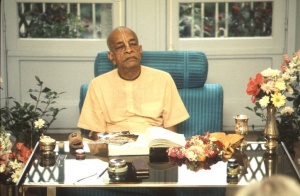CC Adi 4.145

A.C. Bhaktivedanta Swami Prabhupada
TEXT 145
vicāra kariye yadi āsvāda-upāya
rādhikā-svarūpa ha-ite tabe mana dhāya
SYNONYMS
vicāra—consideration; kariye—I do; yadi—if; āsvāda—to taste; upāya—way; rādhikā-svarūpa—the nature of Śrīmatī Rādhārāṇī; ha-ite—to become; tabe—then; mana—mind; dhāya—chases.
TRANSLATION
“If I deliberate on a way to taste it, I find that I hanker for the position of Rādhikā.”
PURPORT
Kṛṣṇa’s attractiveness is wonderful and unlimited. No one can know the end of it. Śrīmatī Rādhārāṇī alone can relish such extensiveness from Her position in the āśraya category. The mirror of Śrīmatī Rādhārāṇī’s transcendental love is perfectly clear, yet it appears clearer and clearest in the transcendental method of understanding Kṛṣṇa. In the mirror of Rādhārāṇī’s heart, the transcendental features of Kṛṣṇa appear increasingly new and fresh. In other words, the attraction of Kṛṣṇa increases in proportion to the understanding of Śrīmatī Rādhārāṇī. Each tries to supersede the other. Neither wants to be defeated in increasing the intensity of love. Desiring to understand Rādhārāṇī’s attitude of increasing love, Lord Kṛṣṇa appeared as Śrī Caitanya Mahāprabhu.